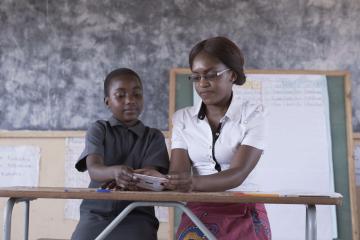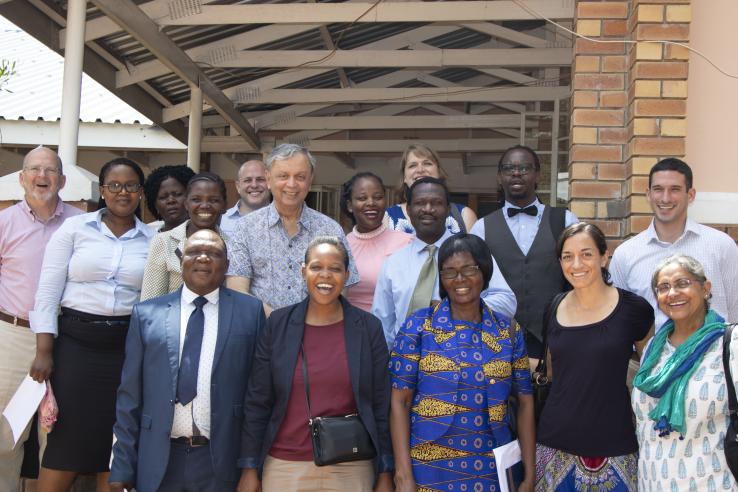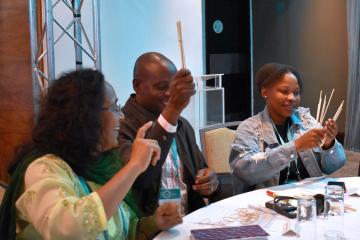
Reflections on seven years at J-PAL Africa working to inform policy with evidence

After seven years working with J-PAL Africa, I am transitioning to a new role working in local school systems in the United States. Working with J-PAL Africa (and, in recent years, TaRL Africa) has been one of the greatest joys of my life. As I step away, I want to share a few reflections about how special J-PAL Africa is, and how our joint work with a myriad of partners has deepened my understanding of how evidence can influence the world.
Expanding J-PAL Africa
I started with J-PAL Africa as a policy manager in 2013, three years after its launch, after working with IPA Uganda for several years. At the time, I knew I wanted to help close the gap between research and policy, and that the role seemed to fit this interest and vision. Even with high expectations, I vastly underestimated how fulfilling, interesting and challenging the work would be.
I started at the same time as Laura Poswell, J-PAL Africa's executive director. We inherited grants that J-PAL had written to bolster its policy teams in the regions and which promised to affect millions of lives through evidence-based interventions and policies. Reading these proposals, I was thrilled to dream about how that might be possible, but also skeptical that such ambitious goals could be achieved. I was honored to work with the support of our J-PAL Africa scientific directors, who at the time were Rachel Glennerster and Tavneet Suri. (Later, Nobel Laureate Abhijit Banerjee took Rachel’s role when she became chief economist at the UK Department for International Development.)
Coming into the team, we inherited a strong relationship with the Government of Rwanda. In fact, on Laura’s and my first day on the job, we attended the Rwanda Decision Science Symposium, which officially launched the partnership between the government of Rwanda and J-PAL. We spent years working with different Ministries in Rwanda, including running several trainings on evidence use and exploring several interventions for possible scale.
We started exploring other leads for evidence-based scale. In Sierra Leone, we worked with the Ministry of Health and the World Food Program to pilot an intervention incentivizing parents to immunize their children. In South Africa, we helped connect the government to Deworm the World so that they could support scaling deworming pills in schools. We also worked with the Department of Labour to embed an evidence-based intervention on reference letters for job seekers in their labour centers.
Taking evidence-informed programs to scale
By far our largest success in my time at J-PAL Africa is through our work on Teaching at the Right Level. We started in Zambia where Ashleigh Morrell (then a policy associate, now J-PAL Africa's associate director of policy) helped lead exploratory meetings with the Ministry of Education about how we could support. She learned that remedial education was a priority and that the Ministry was interested in learning about an evidence-based approach developed by Indian NGO Pratham. We worked with the Ministry to design a pilot of the approach in Zambia and to set up learning journeys for the Ministry to travel to India, and for Pratham to come to Zambia. IPA Zambia conducted independent process monitoring of the pilot and found that the process worked well. The rest, as they say, is history.
With the help of many partners, the Ministry of General Education in Zambia has now scaled Teaching at the Right Level to 227,000 learners in 1,800 schools (roughly 20% of the country), with plans for rapid expansion when schools reopen. Ten other countries in Africa are now running the approach.
After several years of working together, J-PAL and Pratham decided that a joint team solely dedicated to supporting the scale up of TaRL Africa was needed, and that team needed to be seeded on the continent. TaRL Africa was formed in 2019, with a full-time managing director, Titus Syengo, joining recently. We are seeing excitement and commitment to the TaRL approach across Africa with many governments, partners, and donors coming together to scale the approach.
But the real magic is in the classroom, where teachers use the simple tools in the approach to unlock their students’ potential. Each year, we are seeing increasing gains in learning outcomes even as the cost per child falls as the approach moves to bigger and bigger scale. The TaRL approach will be a critical tool for schools to use when they finally return from pandemic-induced school closures as the simple, low-cost approach can rapidly make up for learning loss.
Hard-won lessons learned
As I reflect back on this adventure, I could realize I could never capture all the lessons I have learned along the way.
I have learned that sometimes supporting evidence-based scale means simply sharing lessons and sometimes it takes the much harder, more complex work of adapting, testing, and supporting as an approach grows to scale.
I have learned about the critical role of strong partnerships and of listening, and I realize that much of what I count as success has only come about because governments, NGOs, multilaterals, and donors have come together to focus on evidence and effectiveness in a new way.
I have also learned humility. Exploratory work is important but also crushing in its failure rate. I have learned that trying to seed something that doesn’t work out is all part of the research process—and will be worth it once even one seed starts to sprout. Finally, I have learned how many amazing people there are in this sector, all striving diligently to make the world a better place.
As I step away from the team, I want to say thank you to my colleagues and partners. I want so much to call you each out by name, but I could never manage to capture all the wonderful, dedicated people and organizations I have met along the way. As I step away from the team, I’m comforted to know that the fire will continue to burn brightly through each of you as you carry forward this important work.
With the COVID pandemic, the need for evidence-based policymaking is suddenly all the more urgent. With reduced resources, tremendous need, and quickly changing circumstances, governments and other actors need rigorous evidence more than ever. I am proud of the role that J-PAL Africa has played on the continent so far, and I’m looking forward to seeing what the team continues to achieve in the future.

